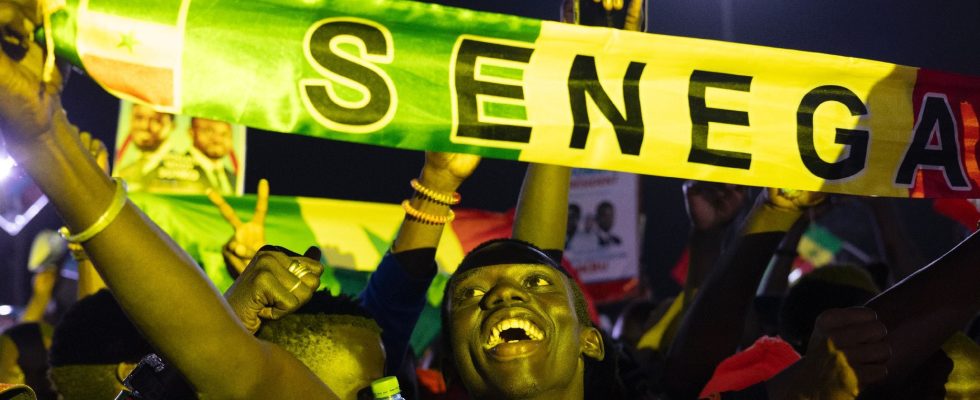Uncertainty persists over the outcome of an election which was to decide between continuity and a perhaps radical change after three years of agitation and political crisis. But the anti-system opponent Bassirou Diomaye Faye appears to be getting closer, this Monday, March 25, in Senegal to a victory in the presidential election which would be akin to a political earthquake, but the power camp has assured that there will be a second round .
Official results are not expected to be known until later this week. An absolute majority of votes cast is required to win in the first round. Otherwise, the first two compete in a second round, the date of which has not been fixed.
At least seven of the 17 candidates congratulated Bassirou Diomaye Faye in view of the counting trend. Anta Babacar Ngom, the only candidate, spoke on X of an “undeniable victory”. “If the trends are confirmed, the candidate Bassirou Diomaye Faye will have received an enthusiastic plebiscite from the Senegalese people,” added Thierno Alassane Sall.
The first results very much in favor of Bassirou Diomaye Faye
The results published office by office in the media and on social networks give a clear advantage to the candidate Bassirou Diomaye Faye ahead of that of power, Amadou Ba, very far ahead of the others.
Hundreds of supporters of Bassirou Diomaye Faye sang and danced to the sound of the tom-tom at his campaign headquarters in Dakar. Processions of young people on motorbikes traveled through the streets of the capital, horns blaring, chanting “to the presidential Palace”. The atmosphere was darker among Amadou Ba’s supporters at his headquarters.
But the campaign management of government candidate Amadou Ba assured that these demonstrations of joy were premature. After counting in a third of the offices and according to her experts, “we are certain to be, in the worst case, in a second round,” she said. She accused the Bassirou Diomaye Faye camp of attempted “manipulation”. “A shift in Senegal into the populist adventure is not inevitable,” she said.
A systemic challenge
A victory for Bassirou Diomaye Faye, 44 years old as of Monday, “candidate for system change” and “left-wing pan-Africanism”, and close to opponent Ousmane Sonko, could herald a real systemic challenge. His program insists on the reestablishment of national “sovereignty”, which he believes has been sold off abroad. He promised to fight corruption and better distribute wealth. He also promised to renegotiate mining, gas and oil contracts concluded with foreign companies.
Senegal could start producing gas and oil in 2024. It embodies “the choice for rupture”, said Bassirou Diomaye Faye of himself, voting alongside his two wives in his village of Ndiaganiao (west). Diaraaf Gaye, a 26-year-old trader, “voted Diomaye without thinking”. “It is time for the country to start on a new basis with young people” in power, he said.
Amadou Ba, 62, would extend the action of the outgoing Macky Sall, of whom he was Prime Minister just a few weeks ago and who appointed him to succeed him.
Voters queued in dozens or hundreds during the day in front of different offices, without any exact assessment of participation (which was 66% in 2019) being provided. No notable incidents were reported and several voters expressed their satisfaction at voting, after the unrest caused by the postponement of the election.
“We finally got there. Alhamdoulila (Praise be to God). Recent times have not been easy for Senegal,” said Mita Diop. “But all that is behind us,” rejoiced this 51-year-old trader, in front of a polling station in Dakar. Some 7.3 million voters were called to vote.
Russia strengthens its positions in the closest countries
The election is being followed closely, with Senegal considered one of the most stable countries in West Africa shaken by putsch. Dakar maintains strong relations with the West, while Russia strengthens its positions in the closest countries. The Senegalese were initially scheduled to vote on February 25.
The postponement of the vote sparked violence which left four people dead. Several weeks of confusion tested Senegal’s democratic practice, until the date of March 24 was decided. The campaign was reduced to two weeks, falling in the middle of the Muslim fasting month. This is the first time that an outgoing president has not run for re-election.
Amadou Ba had to take on the legacy of President Sall, persistent poverty, high unemployment, and the hundreds of arrests of recent times. Since 2021, the country has experienced episodes of unrest caused by the standoff between Ousmane Sonko and those in power, combined with social tensions and the vagueness long maintained by President Sall over his candidacy for a third term. The crisis continued with the postponement of the presidential election.
